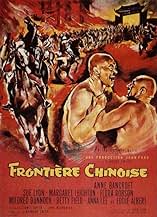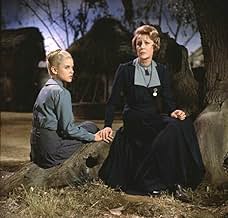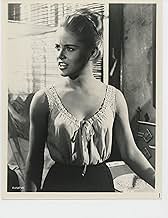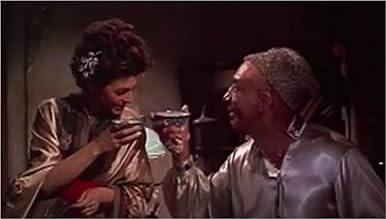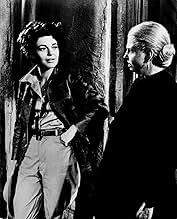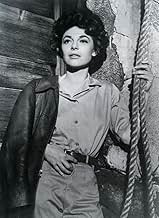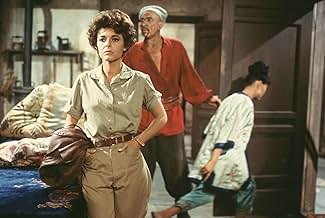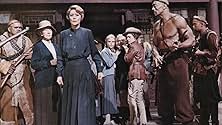AVALIAÇÃO DA IMDb
6,7/10
2,9 mil
SUA AVALIAÇÃO
Adicionar um enredo no seu idiomaIn 1935 China, seven dedicated missionary women try to protect themselves from the advances of a barbaric Mongolian warlord and his cut-throat gang of warriors.In 1935 China, seven dedicated missionary women try to protect themselves from the advances of a barbaric Mongolian warlord and his cut-throat gang of warriors.In 1935 China, seven dedicated missionary women try to protect themselves from the advances of a barbaric Mongolian warlord and his cut-throat gang of warriors.
- Direção
- Roteiristas
- Artistas
- Prêmios
- 1 indicação no total
Lee Kolima
- Warrior
- (não creditado)
- Direção
- Roteiristas
- Elenco e equipe completos
- Produção, bilheteria e muito mais no IMDbPro
Avaliações em destaque
...what a moving last picture for Ford's swansong.Too often underrated ,"Seven woman" in spite of a sometimes weak script-too many things happen in too little time- is perhaps the most modern film in Ford 's canon.
We find one of Ford's permanent features:a group of human beings in jeopardy who's got to struggle against an enemy:"Stagecoach" is the best example .Dudley Nichols's screenplay was inspired by Guy de Maupasssant's "Boule de Suif".
Women always played a prominent part in Ford's canon.Ford's world is deceptive :it seems to be a male world but actually women are the strongest and the wisest (Jane Darwell's character in "Wagon Master" ,the soldiers' wives in "Fort Appache" ).It was only natural that Ford's last movie was an all-women film (all men,including Albert's character are caricatures.) And these women are very endearing.Anne Bancroft,one of the greatest actresses America ever had, shines all along the movie ,and even when the script verges on grotesque ,she's still beaming, fascinating ,never losing her sense of humor.Even when she "becomes Chinese" ,nobody would think of laughing at her.She's so strong an actress that we seem to know her heroine intimately,her life in NYC people dispensaries,her sad love stories.With her masculine swagger,her boots ,her cigarettes and her whiskey we see a broken woman who has lost all her illusions.She's an atheist,which is very rare in Ford's canon.
Religion is in the center of many a Ford movie ."Seven Women" takes place in a mission .All these women put their faith in God and ...in America (We're American citizens!).One of them (Margaret Leighton) is particularly interesting : a tight-lipped puritan at the beginning of the movie,she becomes,slowly but inexorably ,a mystic lunatic,mentioning Babylon and sinners.Like "Stagecoach" ,"seven femmes " borrows from Maupassant.Like his heroine,"Boule De suif" Cartwright gives her life in sacrifice so the others can survive.
Six Woman are leaving Sodom under an ominous sky :one of them is screaming about lust while the blonde schoolteacher (Sue Lyon,whose role is an equivalent of Caroll Baker's in "Cheyenne Autumn ,though it's an underwritten part ),along with the newborn child, represents hope for the future:all that she went through ,her late heroine (she was the only one to be nice with Cartwright when she arrived)might help her to carry on.But Ford's last opus,like Huston's "the dead" is a very pessimistic opus.
We find one of Ford's permanent features:a group of human beings in jeopardy who's got to struggle against an enemy:"Stagecoach" is the best example .Dudley Nichols's screenplay was inspired by Guy de Maupasssant's "Boule de Suif".
Women always played a prominent part in Ford's canon.Ford's world is deceptive :it seems to be a male world but actually women are the strongest and the wisest (Jane Darwell's character in "Wagon Master" ,the soldiers' wives in "Fort Appache" ).It was only natural that Ford's last movie was an all-women film (all men,including Albert's character are caricatures.) And these women are very endearing.Anne Bancroft,one of the greatest actresses America ever had, shines all along the movie ,and even when the script verges on grotesque ,she's still beaming, fascinating ,never losing her sense of humor.Even when she "becomes Chinese" ,nobody would think of laughing at her.She's so strong an actress that we seem to know her heroine intimately,her life in NYC people dispensaries,her sad love stories.With her masculine swagger,her boots ,her cigarettes and her whiskey we see a broken woman who has lost all her illusions.She's an atheist,which is very rare in Ford's canon.
Religion is in the center of many a Ford movie ."Seven Women" takes place in a mission .All these women put their faith in God and ...in America (We're American citizens!).One of them (Margaret Leighton) is particularly interesting : a tight-lipped puritan at the beginning of the movie,she becomes,slowly but inexorably ,a mystic lunatic,mentioning Babylon and sinners.Like "Stagecoach" ,"seven femmes " borrows from Maupassant.Like his heroine,"Boule De suif" Cartwright gives her life in sacrifice so the others can survive.
Six Woman are leaving Sodom under an ominous sky :one of them is screaming about lust while the blonde schoolteacher (Sue Lyon,whose role is an equivalent of Caroll Baker's in "Cheyenne Autumn ,though it's an underwritten part ),along with the newborn child, represents hope for the future:all that she went through ,her late heroine (she was the only one to be nice with Cartwright when she arrived)might help her to carry on.But Ford's last opus,like Huston's "the dead" is a very pessimistic opus.
John Ford's swan song is very underrated. Anne Bancroft plays a chain-smoking doctor who has fled the United States (for reasons unknown, unless they were explained during the minute or so I was away to answer the phone) to work at a mission in China. Margaret Leighton plays the head of this mission, a devout Christian who controls her underlings with strict rules. Various troubles ensue, the most prominent being the threat of a cholera epidemic, a raid by Mongolian bandits, and a pregnant woman who is nearing menopause, which makes the birth a very difficult situation. It is the second problem which I mention that takes up most of the plot. The mission has heard stories of these Mongolians in the nearby areas. Leighton is sure that they will never dare attack her mission, by the grace of God and America. But they do, and they keep all the white women hostage after killing off every Chinese person in sight. They believe that they can win a ransom for them. The tough Bancroft bravely opposes them, but she can make no headway by those means. Instead, the leader of the bandits demands sex. In this way, she is able to influence the way the women are treated (especially concerning the birth). The main conflict of the film is between Leighton and Bancroft. It's very 60s, with the progressive, liberated woman fighting against the strict, sexless one. The role of religion is very interesting in the film. It's shocking that Ford, a devout Catholic, would make the headmistress so foolish. It's a very intelligent criticism of the holier-than-thou attitude of some. When death looks imminent, Leighton seems almost excited to become a martyr; and she's willing and ready to take everyone else with her. When Bancroft sees her chance to save the others, Leighton viciously attacks her for being the "whore of Babylon." The final scene is quite excellent. What a great way for the greatest director of all time end his career.
Finished in 1965 and belatedly released a year later, 7 Women represents director John Ford's final bow on the silver screen after a long and extremely significant foray into the world of celluloid. Existing as something of an atypical swan song for the long renowned film-maker, the feature is one that suffers from an overall lack of ideas, but which also pulls this weakness to be its central force of power. Employing a recurring theme of empowerment in the face of defeat and a defiance of authority, blind-faith and outdated ideals, 7 women is at its heart, sixties film-making at its most empowering and critical. It may not be as elegant as other works of the decade, nor as moving, but blessed with a wonderful sense of character and performance, John Ford achieves one of his most significant works here with a piece of film that all things considered, should never be as such.
I say this, mainly, because 7 Women is something of a canned movie. In this vein, the feature, like a few of Ford's previous efforts, feels like a play rather than a movie. Through this minimalist tone, Ford strikes a stern focus on character and theme, rather than obtuse action or plot—two elements which could have easily been given the spotlight by any other film-maker had they chosen to. You see, telling the story of a small missionary camp set up in a civil-war-torn China during the late thirties, 7 Women finds its roots in theatre drama, yet also mixes an element of danger into the mix too, outside of any inherent character conflict (though, one could argue such plot devices are perfunctory and only serve merely as a catalyst to explore these characters more effectively). Under the attack of a rogue gang of savage bandits known for their pillaging, torture, rape and murder of several nearby missionary outposts, Ford attempts to bring out the absolute base levels of his characters—to put them under the microscope to see who they really are. The results are interesting, albeit predictable, yet the overall experience boils down to one of subtle reflection.
As mentioned above, and indeed more than made obvious by the movie's title, key to this somewhat somber approach is in the screenplay's devotion to character rather than plot; and what a character we have here. While ostensibly telling the story of the seven women staffed by the Catholic Church to help deliver these poor souls, the central point of Ford's story here instead chooses to focus on the black sheep of the bunch, Dr. Cartwright. Cartwright, played by an endlessly captivating Anne Bancroft, is a last-resort chain-smoking, binge-drinking, foul mouthed, pant-wearing doctor who would rather talk to the bottom of her glass than to the higher being in the sky everyone else around her seems content to confide in. Straight away Ford plays her as being as the misfit malcontent that she obviously would be in this situation, yet he does well to establish her as anything but incompetent with her duties. Following this theme through right to the movie's finest point (the very last scene which in itself is worth the ninety minutes that precede it), Dr. Cartwright ends up stealing the show at every turn—sure, there are ideas here about humanitarian needs outweighing those of a clergy (most of which are needlessly heavy-handed and all too frequent with no real penetration involved), and there are more than a few other interesting characters here, but for the most part 7 Women is much more the story of 1 Woman, and well, that's probably for the best.
This isn't to say that there's not much to see outside of this wonderful pairing of Ford and Bancroft; it's just that this will be what you no doubt will take away from the feature as being its most enjoyable aspect. And with that said, it's important to stress that while 7 Women may not be as wholly enjoyable or entertaining or indeed significant as some of Ford's previous work, it nevertheless manages to stand on its own two feet—much like our beloved Cartwright—without pandering to expectations either of its audience or of its society at the time. Much like many films of the sixties, 7 Women is a daring and often compelling look at ourselves, whether through our hopes and dreams, our loves and faiths or our demons and tragedies. Not only that but it's the final statement of a director that gave cinema many of its greatest hours, and in that vein, 7 Women gains some significance without ever sacrificing its distinctly restrained and quietly contemplative mood.
I say this, mainly, because 7 Women is something of a canned movie. In this vein, the feature, like a few of Ford's previous efforts, feels like a play rather than a movie. Through this minimalist tone, Ford strikes a stern focus on character and theme, rather than obtuse action or plot—two elements which could have easily been given the spotlight by any other film-maker had they chosen to. You see, telling the story of a small missionary camp set up in a civil-war-torn China during the late thirties, 7 Women finds its roots in theatre drama, yet also mixes an element of danger into the mix too, outside of any inherent character conflict (though, one could argue such plot devices are perfunctory and only serve merely as a catalyst to explore these characters more effectively). Under the attack of a rogue gang of savage bandits known for their pillaging, torture, rape and murder of several nearby missionary outposts, Ford attempts to bring out the absolute base levels of his characters—to put them under the microscope to see who they really are. The results are interesting, albeit predictable, yet the overall experience boils down to one of subtle reflection.
As mentioned above, and indeed more than made obvious by the movie's title, key to this somewhat somber approach is in the screenplay's devotion to character rather than plot; and what a character we have here. While ostensibly telling the story of the seven women staffed by the Catholic Church to help deliver these poor souls, the central point of Ford's story here instead chooses to focus on the black sheep of the bunch, Dr. Cartwright. Cartwright, played by an endlessly captivating Anne Bancroft, is a last-resort chain-smoking, binge-drinking, foul mouthed, pant-wearing doctor who would rather talk to the bottom of her glass than to the higher being in the sky everyone else around her seems content to confide in. Straight away Ford plays her as being as the misfit malcontent that she obviously would be in this situation, yet he does well to establish her as anything but incompetent with her duties. Following this theme through right to the movie's finest point (the very last scene which in itself is worth the ninety minutes that precede it), Dr. Cartwright ends up stealing the show at every turn—sure, there are ideas here about humanitarian needs outweighing those of a clergy (most of which are needlessly heavy-handed and all too frequent with no real penetration involved), and there are more than a few other interesting characters here, but for the most part 7 Women is much more the story of 1 Woman, and well, that's probably for the best.
This isn't to say that there's not much to see outside of this wonderful pairing of Ford and Bancroft; it's just that this will be what you no doubt will take away from the feature as being its most enjoyable aspect. And with that said, it's important to stress that while 7 Women may not be as wholly enjoyable or entertaining or indeed significant as some of Ford's previous work, it nevertheless manages to stand on its own two feet—much like our beloved Cartwright—without pandering to expectations either of its audience or of its society at the time. Much like many films of the sixties, 7 Women is a daring and often compelling look at ourselves, whether through our hopes and dreams, our loves and faiths or our demons and tragedies. Not only that but it's the final statement of a director that gave cinema many of its greatest hours, and in that vein, 7 Women gains some significance without ever sacrificing its distinctly restrained and quietly contemplative mood.
"Seven Women" is the last feature film of John Ford, arguably the greatest director the United States has yet produced. After a half century of film making, Ford ended his fabled career with a wide screen feature about women in peril at a Chinese mission. Infirm and alcoholic, he filmed it on an MGM sound stage; MGM then cut it and tossed it away on the bottom half of a double bill.
Today, the film is little known and seldom seen. It is far from Ford's best work, yet there is power and believability in many of the lead performances, and power in the arc of the story. Anne Bancroft shines as a feisty New York doctor who ultimately sacrifices herself to save the other missionaries -- many whom she doesn't agree with -- from brutal deaths at the hands of Chinese bandits. Her work here is more forceful and better realized than her role of Mrs. Robinson, done two years later.
The best gift MGM/Sony could give lovers of serious cinema is a clean print of this forgotten film. Its sets are often glaringly artificial, and some of the secondary players are over the top (an old weakness of Ford's) as well as miscast, but "7W" is a far better film than Hollywood legend has told us.
Today, the film is little known and seldom seen. It is far from Ford's best work, yet there is power and believability in many of the lead performances, and power in the arc of the story. Anne Bancroft shines as a feisty New York doctor who ultimately sacrifices herself to save the other missionaries -- many whom she doesn't agree with -- from brutal deaths at the hands of Chinese bandits. Her work here is more forceful and better realized than her role of Mrs. Robinson, done two years later.
The best gift MGM/Sony could give lovers of serious cinema is a clean print of this forgotten film. Its sets are often glaringly artificial, and some of the secondary players are over the top (an old weakness of Ford's) as well as miscast, but "7W" is a far better film than Hollywood legend has told us.
7 Women (1966)
Anne Bancroft fans, check out the forgotten drama 7 Women. She plays a tough, capable woman doctor sent to a missionary in China. This isn't important, but her short, curly hair is just adorable. What is important is the setting: a small village with limited resources and impending doom. Margaret Leighton heads up the missionary, and even though she's received word that a ruthless Mongolian bandit is headed their way, she refuses to flee to a safer location. She believes that the bandits will respect their Christianity and leave them unharmed, but when Anne arrives, she scoffs at the notion that religion will protect them.
Eddie Albert and his pregnant wife, Betty Field, need Anne's services the most. As an older woman, the pregnancy could have complications, but they also refuse to leave. Sue Lyon is an impressionable girl who first looks up to Margaret and then Anne. Flora Robson and Mildred Dunnock are also in the supporting cast. What can seven women and one useless man (sorry, Eddie) do when faced with such terrible danger? This very tense drama has a lot going for it, but strong women beware: it's upsetting. You won't see the twists and turns coming, and when they happen you'll probably be in shock for a while. But you will think Anne Bancroft is the bravest lady ever.
Eddie Albert and his pregnant wife, Betty Field, need Anne's services the most. As an older woman, the pregnancy could have complications, but they also refuse to leave. Sue Lyon is an impressionable girl who first looks up to Margaret and then Anne. Flora Robson and Mildred Dunnock are also in the supporting cast. What can seven women and one useless man (sorry, Eddie) do when faced with such terrible danger? This very tense drama has a lot going for it, but strong women beware: it's upsetting. You won't see the twists and turns coming, and when they happen you'll probably be in shock for a while. But you will think Anne Bancroft is the bravest lady ever.
Você sabia?
- CuriosidadesAnne Bancroft recalled producer and director John Ford's tearing pages out of the script and described him as "Marvelous but loony."
- Erros de gravaçãoDr. Cartwright's hairstyle is not out of place for 1935. Dr. Cartwright is a strong, independent woman and it is not unusual for her to have this type of hairstyle - see Amelia Earhart. Besides, short hair worn off the shoulder was a very popular style in the 1930s.
- Citações
Dr. D.R. Cartwright: [to Tunga Khan, Bandit Leader] So long, ya bastard!
- Cenas durante ou pós-créditosPROLOGUE: "1935: North China near the border of Mongolia...A land of feudal war lords and marauding bandit armies...A time of lawlessness and violence."
- ConexõesReferenced in MGM 40th Anniversary (1964)
- Trilhas sonorasJesus Loves Me
(uncredited)
Words by Anna B. Warner and David Rutherford McGuire
Music by William B. Bradbury
Sung by Sue Lyon and the children
Principais escolhas
Faça login para avaliar e ver a lista de recomendações personalizadas
- How long is 7 Women?Fornecido pela Alexa
Detalhes
- Data de lançamento
- País de origem
- Idiomas
- Também conhecido como
- Sete Mulheres
- Locações de filme
- Empresas de produção
- Consulte mais créditos da empresa na IMDbPro
Bilheteria
- Orçamento
- US$ 2.300.000 (estimativa)
- Faturamento bruto mundial
- US$ 228
- Tempo de duração
- 1 h 27 min(87 min)
- Cor
- Proporção
- 2.35 : 1
Contribua para esta página
Sugerir uma alteração ou adicionar conteúdo ausente


